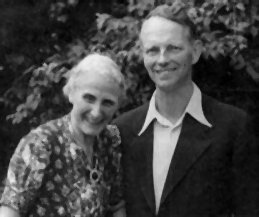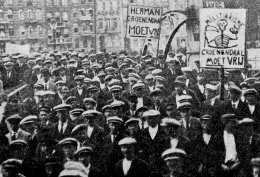In the course of scanning through the ninety or so volumes of The Friend (the Philadelphia journal of that title) available through Google Books, covering about a century, the most telling example of the decline of war tax resistance in the Society of Friends was perhaps the headline the journal chose to give the following article, from its edition:
Testimony-Bearing of the Seventeenth Century Type
The following item appeared in The Friend (London) of :—
R. Barclay Murdoch writes of a recent visit to Bilthoven, Holland, paid en route to Germany, and of fellowship there with Cornelis and Beatrice Boecke. He says: “Many Friends are aware that Cornelis and Beatrice Cadbury Boecke have several times been torn away from their family (five little girls, the eldest but eleven), and imprisoned because of their unflinching testimony against war, and fearless preaching of the Gospel of peace and good-will. It may not be so generally known that, last year, the Dutch Government took away considerably over £200 worth of furniture, &c, for the nonpayment of a military tax. Letters just to hand tell of the likelihood of another distraint for the same tax this year, and further persecution and prosecution because of the encouragement they are giving to young men who, for conscience’ sake, are resisting and intend to resist the operation of the Conscription law. The drawing of lots for the purposes of this law takes place within the next few weeks, and our Friends earnestly desire the sympathy and prayers of Friends, that they may be upheld in bearing the testimony to which they feel called.
“Having felt called upon, in obedience to their Lord and Master, to surrender all their worldly investments and possessions, they are now entirely dependent upon their own industry for their subsistence. The principal means at their disposal for this purpose is photography, and they are producing some very fine views of the district, etc.”
Of course, American Friends in didn’t need to hearken all the way back to the seventeenth century to find exemplars like this. They could have looked to their own tradition, and examples no more than a few decades old. But by it seems like a great forgetting had taken hold, and war tax resistance had come to be seen as a relic of the past like “thee”s and “thou”s.
Cornelis Boeke sounds like he was an interesting character. Next time you watch Charles & Ray Eames’s classic documentary short Powers of Ten, which tries to visualize the universe from the largest to the smallest scales conceivable by human understanding, note at the end of the credits it says “with much gratitude to Kees [Cornelis] Boeke.” The Eameses were inspired by Boeke’s book Cosmic View which was an earlier attempt at the same sort of project.
According to Wikipedia, “for a while the Boekes refused to use money and avoid contributing to the state as they also spend on weapons; they wouldn’t pay postage, tolls, or taxes and they never used public transport. They were imprisoned several times, and one of their seven children was born in prison. On one occasion the Dutch tax authorities auctioned off his estate to collect taxes, and the then Queen, Wilhelmina, bought his favorite violin out of the auction with her own money, and gave it back to him on the spot.”
Here’s another note about war tax resistance in Holland in from The Friend:
The Struggle for Freedom in Holland
H. Runham Brown, a C.O. who was closely associated with Friends during the war and is a member of the Committee of the No More War International Movement, writes:—
I have spent twenty-four hours in Holland on my way into Germany. On leaving the train at Utrecht in the early morning of the 1st (ultimo.) I was at once plunged into the atmosphere of the English C.O. Movement of .
The city is placarded with little orange bills demanding the release of a conscientious objector who is on hunger strike — Herman Groenendaal. There are forty still in prison; over six hundred have been through prison, while many homes have been sold to pay the military taxes, which are fifty-one per cent, of the whole taxes in Holland. [Bart] De Light, the President of the International Anti-Militarist Bureau, has been arrested to prevent his propaganda.
The police came to my bed-room door within five minutes of my arrival at the hotel; all day we walked about Utrecht with the demand on our hats “Herman Groenendaal must go free.” A grand placard depicting a Dutch soldier standing over the prostrate body of Groenendaal, with Christ in the background asking “Are you doing this in my name?” was being carried through the streets.
In the evening five hundred people met in the Corn Exchange (in Rotterdam the night before there were two thousand). We breathed the No-Conscription atmosphere in the days of the Conscription Acts. Boeke, Giesen. Eckhard and Harinch demanded Groenendaal’s release, and the liberation of De Light and the other thirty-nine.
Only once when I said, for I had to speak in English, Giesen translated, that we were out against a system and not individuals, did the stern row of police officers unfold their arms, and turn to each other with approval.
The enthusiasm was unbounded. Holland is entering into a big struggle, and they are looking to the English C.O.s to help them. What are we going to do about it?
The No More War Movement and The International Anti-Militarism Bureau were forerunners of War Resisters International.


